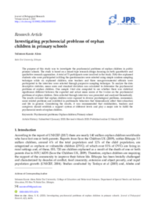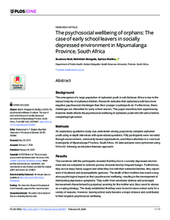Displaying 91 - 100 of 525
The aim of the study was to document mental health service use (counseling and medication) among youth in foster care, examine how prepared they feel to manage their mental health, and investigate predictors of service use and preparedness.
This study intended to identify factors associated with receipt of mental health services by caregivers substantiated for maltreatment.
The purpose of this study was to test the effectiveness and feasibility of a brief trans diagnostic Acceptance and Commitment Therapy (ACT) group intervention for youth with comorbid problems in residential care.
Preliminary findings from studies using abbreviated formats of Parent-Child Interaction Therapy (PCIT) suggest effectiveness of such adaptations in reducing externalizing behavior in foster children and maintaining behavioral improvements several months after the end of the treatment.
For this study, one hundred and twenty‐six 11–21 year olds (53 who had experience of the care system and 73 who did not) were recruited from the community and NHS. All participants had self‐harmed in the past 6 months. Participants completed an Audio Computer‐Assisted Self‐interview (ACASI) regarding their views about the support they had received, how helpful it was, and what further help they felt they needed.
The current study seeks to explore clinicians' and parents' perspectives regarding the role of psychotherapy services (e.g. individual or conjoint counselling/therapy) for child welfare cases.
The purpose of this study was to investigate the psychosocial problems of orphan children in public primary schools in Ethiopia.
The present study of children’s caregivers involved in child welfare examined the factors associated with their receiving services for substance use.
The primary aim of this chapter is to outline the significance of trauma in the lives of parents involved in the child protection system who are sent for forensic psychological evaluations.
This paper describes how experiencing maternal death affects the psychosocial wellbeing of orphaned youth who left school before completing high school.


